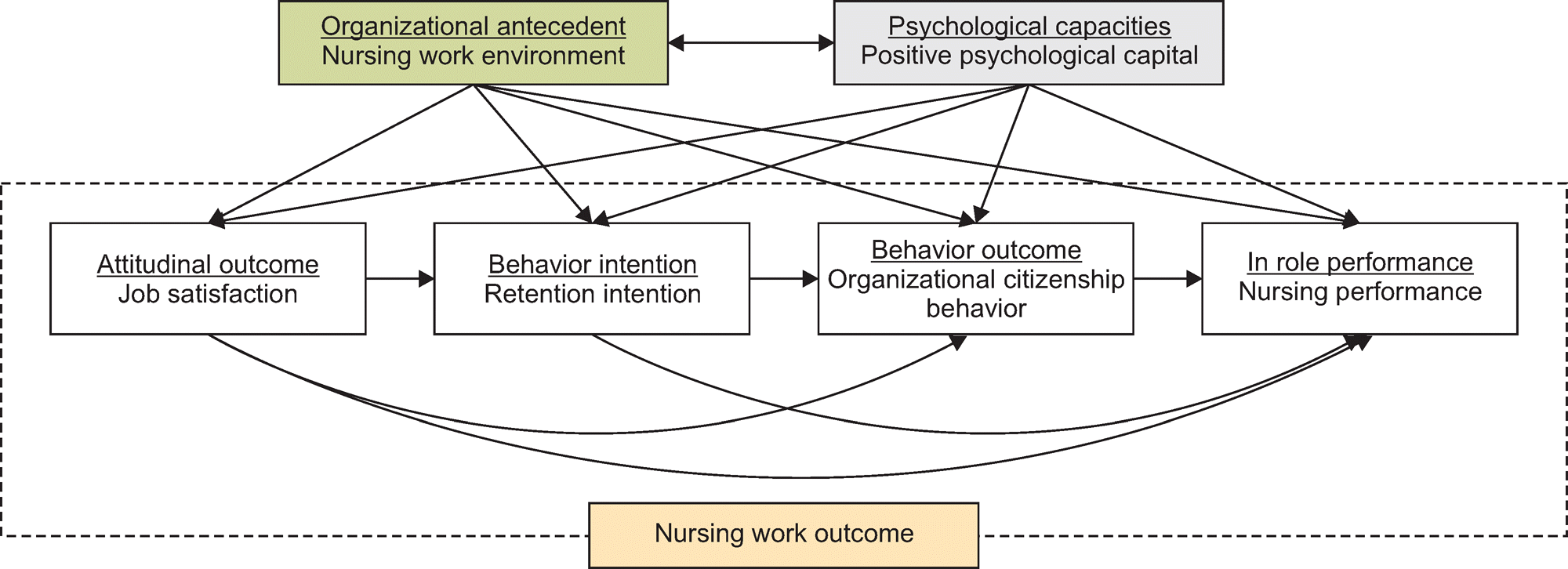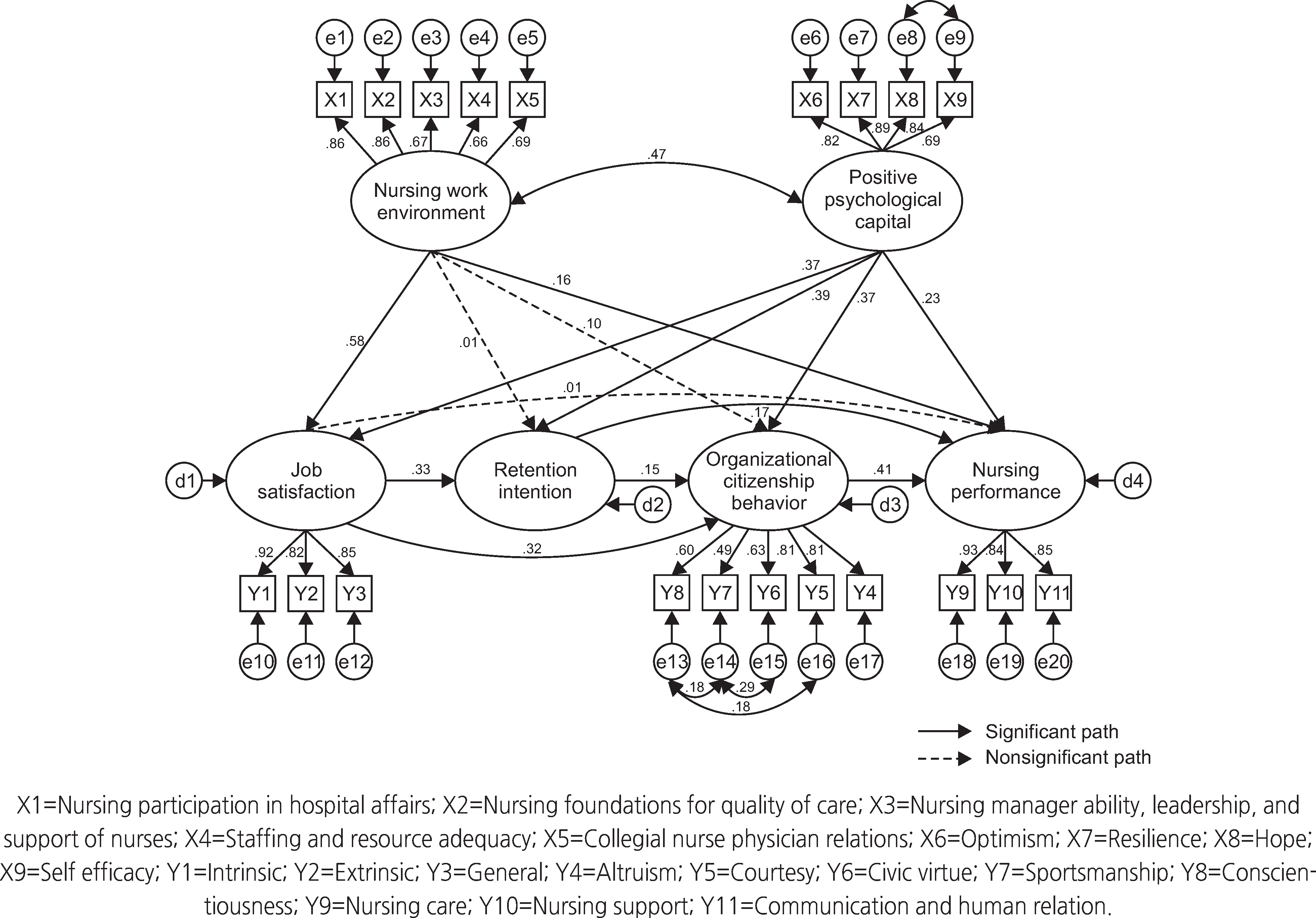Abstract
Purpose:
The purpose of this study was to construct and test a structural equation model on nursing work outcomes based on Youssef and Luthans’ positive psychological capital and integrated conceptual framework of work performance.
Methods:
This study used a structured questionnaire administered to 340 nurses. Data were analyzed using structural equation modeling.
Results:
Positive psychological capital showed indirect and direct effects on job satisfaction, retention intention, organizational citizenship behavior, and nursing performance. While, the nursing work environment had direct and indirect effects on job satisfaction and nursing performance, it only had indirect effects on intention to work and organizational citizenship behavior. Additionally, a mediating effect on retention intention and organizational citizenship behavior was found between job satisfaction and nursing performance variables.
Conclusion:
The nursing organization needs to build a supportive work environment and reinforce positive psychological capital to improve nursing performance. Additionally, it needs to actively manage the necessary parameters involved in the stages of job satisfaction, retention intention, nursing performance, and organizational citizenship behavior of nurses. The findings propose the continuous management of nursing personnel based on nurses’ attitude outcome, behavioral intention, behavioral outcome, and stage of role performance.
Go to : 
REFERENCES
1. Noh, GM, Yoo, MS. Effects of workplace spirituality and organizational citizenship behavior on nursing performance. Journal of Korean Academy of Nursing Administration. 2016; 22(3):251–259. https://doi.org/10.11111/jkana.2016.22.3.251.
2. Ko YK, Lee TW, Lim JY. Development of a performance measurement scale for hospital nurses. Journal of Korean Academy of Nursing. 2007; 37(3):286–294. https://doi.org/10.4040/jkan.2007.37.3.286.

3. Lee TW, Ko YK. Effects of self‐efficacy, affectivity and collective efficacy on nursing performance of hospital nurses. Journal of Advanced Nursing. 2010; 66(4):839–848. https://doi.org/10.1111/j.1365-2648.2009.05244.x.

4. Ha NS, Choi J. An analysis of nursing competency affecting on job satisfaction and nursing performance among clinical nurses. Journal of Korean Academy of Nursing Administration. 2010; 16(3):286–294.

5. Park SA, Kim JH, Park KO, Kim MS, Kim SY. Development a tool for evaluating nurses’ performance in hospital units. Journal of Korean Clinical Nursing Research. 2009; 15(2):5–21.
6. Purdy N, Spence Laschinger HK, Finegan J, Kerr M, Olivera F. Effects of work environments on nurse and patient outcomes. Journal of Nursing Management. 2010; 18(8):901–913. https://doi.org/10.1111/j.1365-2834.2010.01172.x.

7. Shang DJ, Friese CR, Wu E, Aiken LH. Nursing practice environment and outcomes for oncology nursing. Cancer Nursing. 2013; 36(3):206–212. https://doi.org/10.1097/NCC.0b013e31825e4293.

8. Dawkins S, Martin A, Scott J, Sanderson K. Building on the positives: A psychometric review and critical analysis of the construct of psychological capital. Journal of Occupational and Organizational Psychology. 2013; 86(3):348–370. https://doi.org/10.1111/joop.12007.

9. Youssef CM, Luthans F. An integrated model of psychological capital in the workplace. Linley PA, Harrington S, Page N, editors. Oxford Handbook of Positive Psychology and Work. New York: Oxford University Press;2010. p. 277–288.

10. Newman A, Ucbasaran D, Zhu F, Hirst G. Psychological capital: A review and synthesis. Journal of Organizational Behavior. 2014; 35(Suppl 1):S120–S138. https://doi.org/10.1002/job.1916.

11. Harrison DA, Newman DA, Roth PL. How important are job attitudes? Meta-analytic comparisons of integrative behavioral outcomes and time sequences. Academy of Management Journal. 2006; 49(2):305–325.

12. Lee HS, Yom YH. Role of self-leadership and social support in the relationship between job embeddedness and job performance among general hospital nurses. Journal of Korean Academy of Nursing Administration. 2015; 21(4):375–385. https://doi.org/10.11111/jkana.2015.21.4.375.

13. Luthans F, Avolio BJ, Avey JB, Norman SM. Positive psychological capital: Measurement and relationship with performance and satisfaction. Personnel Psychology. 2007; 60(3):541–572. https://doi.org/10.1111/j.1744-6570.2007.00083.x.

14. Lee SN, Kim JA. Concept analysis of positive psychological capital. Journal of Korean Academy of Nursing Administration. 2017; 23(2):181–190. https://doi.org/10.11111/jkana.2017.23.2.181.

15. Avey JB, Wernsing TS, Luthans F. Can positive employees help positive organizational change? Impact of psychological capital and emotions on relevant attitudes and behaviors. Journal of Applied Behavioral Science. 2008; 44(1):48–70. https://doi.org/10.1177/0021886307311470.

16. Sun T, Zhao XW, Yang LB, Fan LH. The impact of psychological capital on job embeddedness and job performance among nurses: A structural equation approach. Journal of Advanced Nursing. 2012; 68(1):69–79. https://doi.org/10.1111/j.1365-2648.2011.05715.x.

17. Zhang LF, You LM, Liu K, Zheng J, Fang JB, Lu MM, et al. The association of Chinese hospital work environment with nurse burnout, job satisfaction, and intention to leave. Nursing Outlook. 2014; 62(2):128–137. https://doi.org/10.1016/j.outlook.2013.10.010.
18. Han MY, Lee MS, Bae JY, Kim YS. Effects of nursing practice environment, compassion fatigue and compassion satisfaction on burnout in clinical nurses. Journal of Korean Academy of Nursing Administration. 2015; 21(2):193–202. https://doi.org/10.11111/jkana.2015.21.2.193.

19. Copanitsanou P, Fotos N, Brokalaki H. Effects of work environment on patient and nurse outcomes. British Journal of Nursing. 2017; 26(3):172–176. https://doi.org/10.12968/bjon.2017.26.3.172.

20. Yu JP. The concept and understanding of structural equation modeling. Seoul: Hannarae Publishing Co.;2012. p. 1–567.
21. Adams A, Bond S. Hospital nurses’ job satisfaction, individual and organizational characteristics. Journal of Advanced Nursing. 2000; 32(3):536–543. https://doi.org/10.1046/j.1365-2648.2000.01513.x.

22. Cowin L. The effects of nurses’ job satisfaction on retention: An Australian perspective. Journal of Nursing Administration. 2002; 32(5):283–291. https://doi.org/10.1097/00005110-200205000-00008.
23. Organ DW. A restatement of the satisfaction-performance hypothesis. Journal of Management. 1988; 14(4):547–557. https://doi.org/10.1177/014920638801400405.

24. Park SA, Park KO, Kim SY, Sung YH. A development of standardized nurse performance appraisal tool. Clinical Nursing Research. 2007; 13(1):197–211.
25. Park SH, Kang J. Development and psychometric evaluation of the Korean nursing work environment scale. Journal of Korean Critical Care Nursing. 2015; 8(1):50–61.
26. Han MH. Correlations among nursing work environment, internal marketing, and organizational citizenship behaviors that hospital nurses perceive [master’s thesis]. Seoul: Yonsei University;2015. p. 1–65.
27. Seo JA, Lee BS. Effect of work environment on nursing performance of nurses in hemodialysis units: Focusing on the effects of job satisfaction and empowerment. Journal of Korean Academy of Nursing Administration. 2016; 22(2):178–188. https://doi.org/10.11111/jkana.2016.22.2.178.

28. Lee MH, Lee JY. Mediation effects of positive psychological capital in the relationship between nurse organization culture and retention intention. Asia-pacific Journal of Multimedia Services Convergent with Art, Humanities, and Sociology. 2018; 8(8):255–268.
29. Park JO, Jung KI. Effects of advanced beginner-stage nurses’ sense of calling, job satisfaction and organizational commitment on retention intention. Journal of Korean Academy of Nursing Administration. 2016; 22(2):137–147. https://doi.org/10.11111/jkana.2016.22.2.137.

30. Chang KW. A study on structural modeling of organizational citizenship behaviors for nurses [dissertation]. Seoul: Kyung Hee University;2010. p. 1–82.
31. Kim MN, Cho OH, Cha KS. Factors associated with the organizational citizenship behavior of nurses in small- and medium-sized hospitals. Journal of Korean Academic Society of Home Health Care Nursing. 2015; 22(1):38–46.
32. Kwon KJ, Ko KH, Kim KW, Kim JA. The impact of nursing professionalism on the nursing performance and retention intention among psychiatric mental health nurses. Journal of Korean Academy of Nursing Administration. 2010; 16(3):229–239. https://doi.org/10.11111/jkana.2010.16.3.229.

33. Kim EH, Lee E. Mediation and moderation effects of organizational citizenship behavior between nursing performance and turnover intention. The Journal of the Korea Contents Association. 2015; 15(11):250–262. https://doi.org/10.5392/JKCA.2015.15.11.250.

34. Han SS, Sohn IS, Kim NE. New nurse turnover intention and influencing factors. Journal of Korean Academy of Nursing. 2009; 39(6):878–887. https://doi.org/10.4040/jkan.2009.39.6.878.

35. Lake ET. Development of the practice environment scale of the nursing work index. Research in Nursing and Health. 2002; 25(3):176–188. https://doi.org/10.1002/nur.10032.

36. Cho E, Choi M, Kim EY, Yoo IY, Lee NJ. Construct validity and reliability of the Korean version of the practice environment scale of nursing work index for Korean nurses. Journal of Korean Academy of Nursing. 2011; 41(3):325–332. https://doi.org/10.4040/jkan.2011.41.3.325.

37. Park IJ. A Validation study of the Minnesota satisfaction questionnaire (MSQ) [master’s thesis]. Seoul: Seoul National University;2005. p. 1–80.
38. Kim MJ. The effect of nursing organizational culture on nurses’ intention of retention [master’s thesis]. Seoul: Hanyang University;2006. p. 1–66.
39. Olds DM, Aiken LH, Cimiotti JP, Lake ET. Association of nurse work environment and safety climate on patient mortality: A cross-sectional study. International Journal of Nursing Studies. 2017; 74:155–161. https://doi.org/10.1016/j.ijnurstu.2017.06.004.

40. Avey JB, Reichard RJ, Luthans F, Mhatre KH. Meta‐analysis of the impact of positive psychological capital on employee attitudes, behaviors, and performance. Human Resource Development Quarterly. 2011; 22(2):127–152. https://doi.org/10.1002/hrdq.20070.

41. Ko MS, Lee HZ, Koh MS. Effects of nurses’ social capital and job engagement on nursing performance: Focused on the mediating effects of organizational citizenship behavior. Journal of Korean Academy of Nursing Administration. 2017; 23(1):42–51. https://doi.org/10.11111/jkana.2017.23.1.42.

42. Kim KS, Son SM. An empirical study on the utilization of action learning to improve positive psychological capital. Korean Management Consulting Review. 2017; 17(4):235–246.
43. Luthans F, Avey JB, Patera JL. Experimental analysis of a web-based training intervention to develop positive psychological capital. Academy of Management Learning & Education. 2008; 7(2):209–221.

44. Bae JH, Jung KY. Effects of positive psychological strength program on the enhancement of junior college students’ feeling of happiness. Korean Journal of Christian Counseling. 2013; 24(3):113–147.
45. Laschinger HKS, Fida R. New nurses burnout and workplace wellbeing: The influence of authentic leadership and psychological capital. Burnout Research. 2014; 1(1):19–28. https://doi.org/10.1016/j.burn.2014.03.002.

46. Jung MR, Jeong E. Effects of nursing practice environment and positive psychological capital in clinical nurses on turnover intention. Journal of Digital Convergence. 2018; 16(2):277–285. https://doi.org/10.14400/JDC.2018.16.2.277.
47. Ryu SA, Moon SH, Choi J, Kim B. Perception of recovery, self-esteem, role performance, and job satisfaction in psychiatric mental heath nurse. Journal of Korean Academy of Nursing Administration. 2012; 18(4):434–441. https://doi.org/10.11111/jkana.2012.18.4.434.

48. Phillips C, Esterman A, Kenny A. The theory of organisational socialisation and its potential for improving transition experiences for new graduate nurses. Nurse Education Today. 2015; 35(1):118–124. https://doi.org/10.1016/j.nedt.2014.07.011.

49. Lee EH, Cho KS, Son HM. A study of hospital nurse’s intention to keep nursing job. Journal of Korean Clinical Nursing Research. 2014; 20(1):15–27.
50. Jang MK, Kim HY. A convergence study on the effects of self-leadership and self-esteem on nursing performance. Journal of the Korea Convergence Society. 2018; 9(2):51–59. https://doi.org/10.15207/JKCS.2018.9.2.051.
Go to : 
Table 1.
General Characteristics (N=340)
Table 2.
Descriptive Statistics of Study Variables (N=340
Table 3.
Effect of Predictor Variables in the Structural Model (N=340)




 PDF
PDF ePub
ePub Citation
Citation Print
Print




 XML Download
XML Download